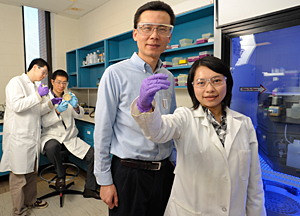Scientists from the University of Delaware (Delaware) in the US are developing a new method for preparing proteins that is essential for research on cancer, Alzheimer's disease and other diseases.

ubiquitin (The entry in Wikipedia) is a small protein, which was at the core of the research that led to the awarding of the Nobel Prize in Chemistry in 2004 to two Israeli scientists (Abraham Hershko and Aharon Chachanover), and whose function is to mark damaged or unwanted proteins in the process of removing waste from the cell during its frequent process of creating and breaking down proteins.
In recent years, its other functions that are not related to the unloading of proteins in diverse cellular processes have also been discovered at a rapid pace, starting with protein transport, immune response to resistance to DNA damage, and it has been clarified that this protein has many more functions than was known until now. However, preparing samples of ubiquitin-related proteins in quantities sufficient for research was a real challenge facing the scientists.
The availability of such proteins is crucial for Zhuang's research group, which deals with the interface between chemistry and biology in an attempt to understand the molecular basis for the development and prevention of cancer in humans.
The new method developed to create these marked proteins combines the power of intron chemistry and cross-linking with the help of disulfide bonds to connect ubiquitin to another essential protein called "proliferating cell nuclear antigen".
"The recovery we received is hundreds of orders of magnitude higher compared to the enzymatic method prevalent today," says the researcher. "In addition, we have the flexibility to change the selected groups, something that did not exist in the previous method."
During the study of the effect of modified proteins, the team of scientists also discovered a surprising phenomenon in connection with the proteins attached to ubiquitin. "We discovered that ubiquitin in its role as a protein modifier is much more flexible than we initially believed. This feature distinguishes ubiquitin-related proteins from other proteins that have been better studied and that have undergone changes following phosphorylation and acetylation," says the lead researcher.
The innovative approach will help scientists studying ubiquitin biology by providing the means to prepare milligrams of protein samples for careful structural characterization. The research findings were published in the scientific journal Nature Chemical Biology. In addition, the innovative approach has already opened a window for new research in Zhuang's own laboratory to test innovative cancer treatment methods.
